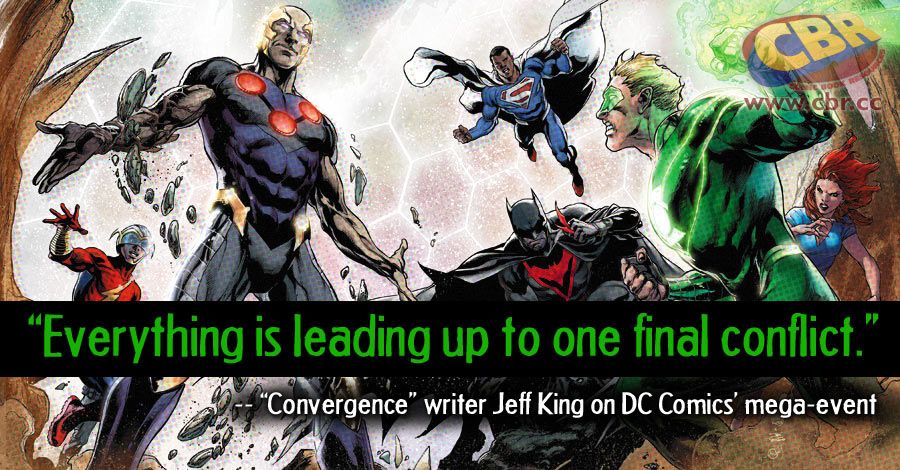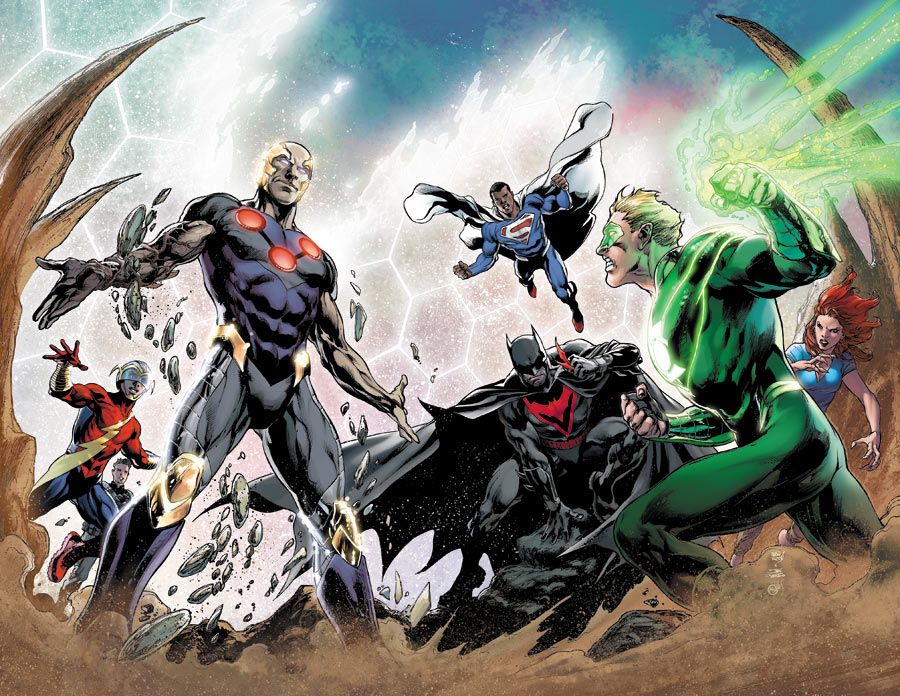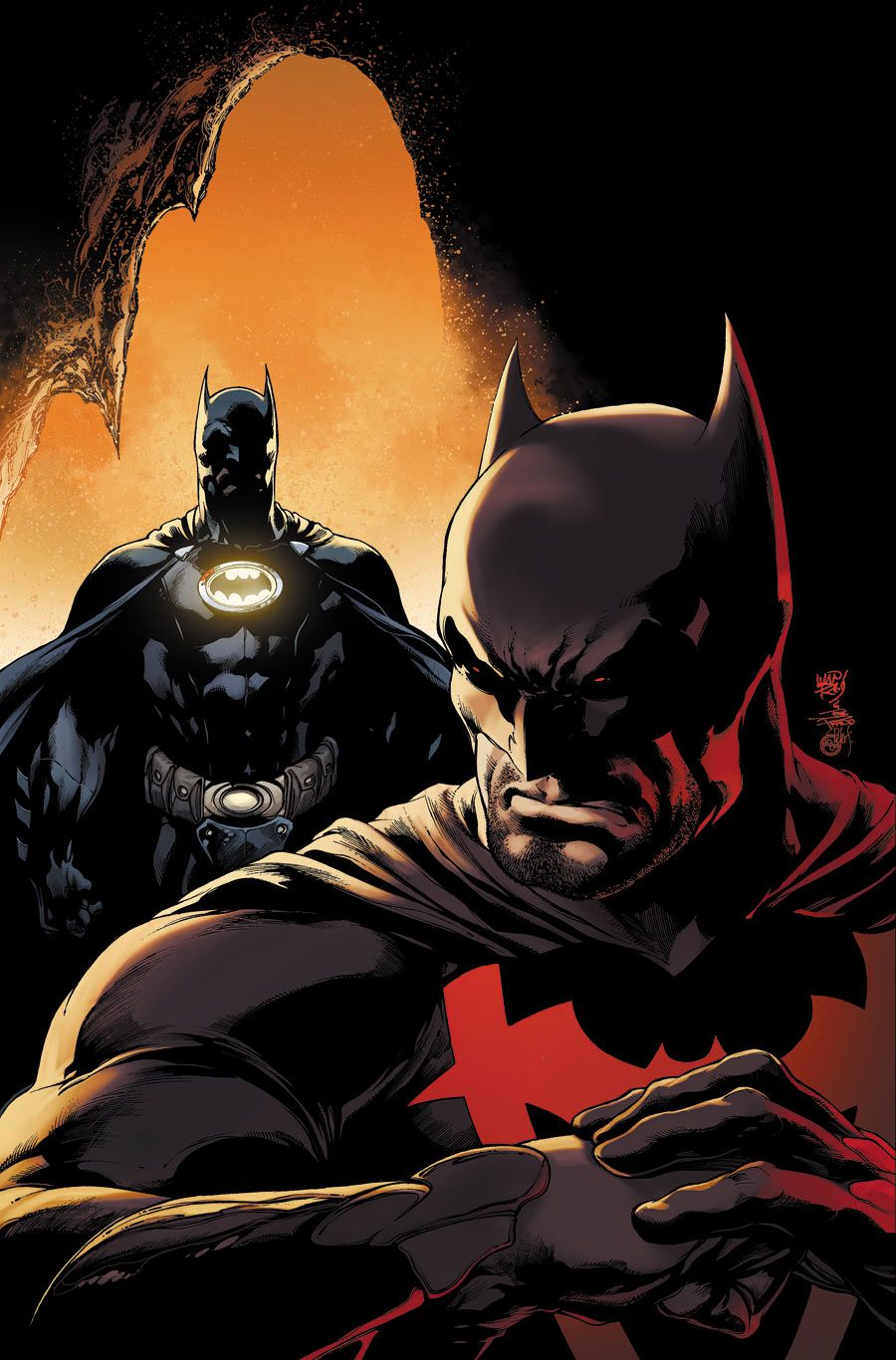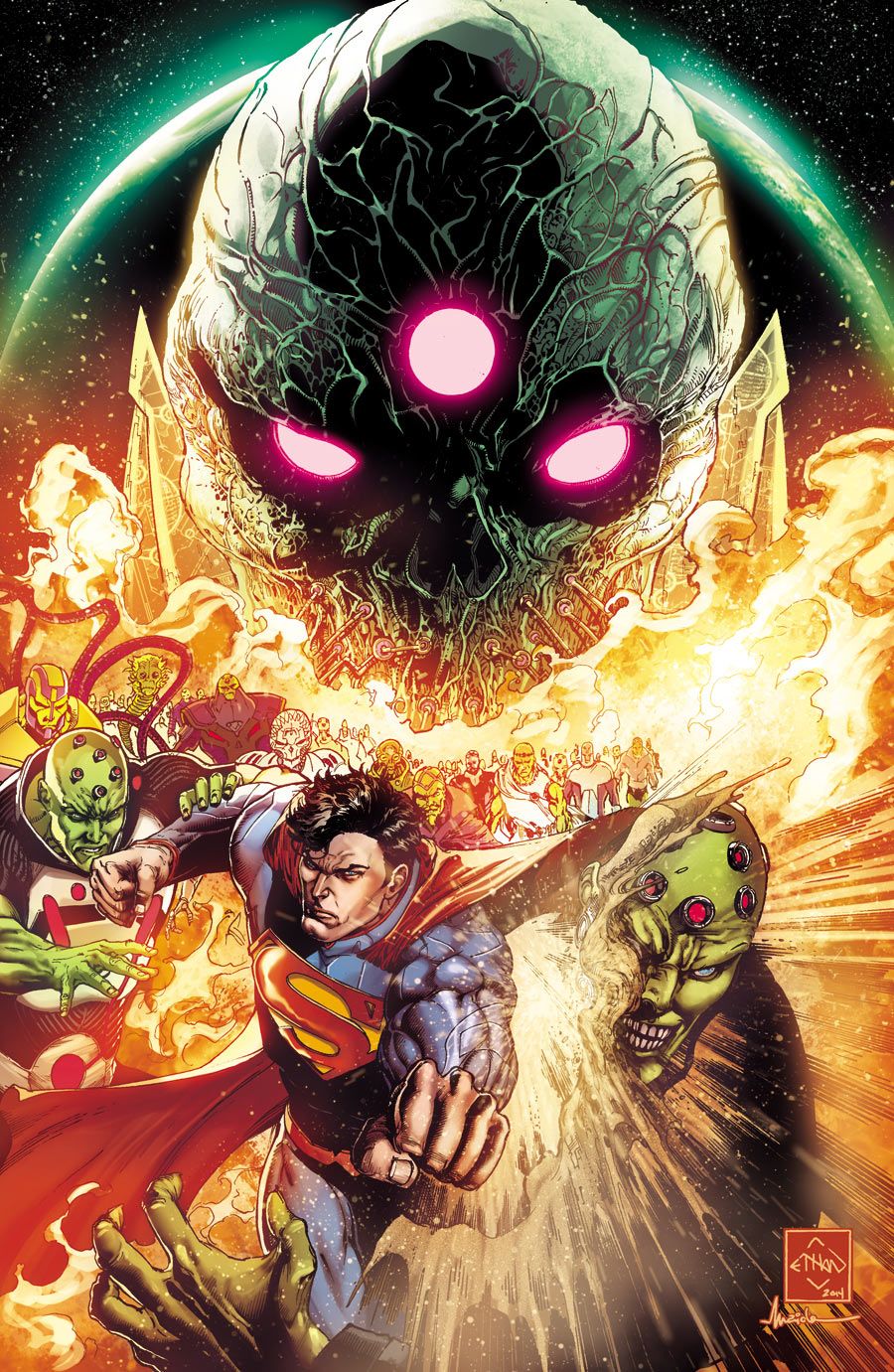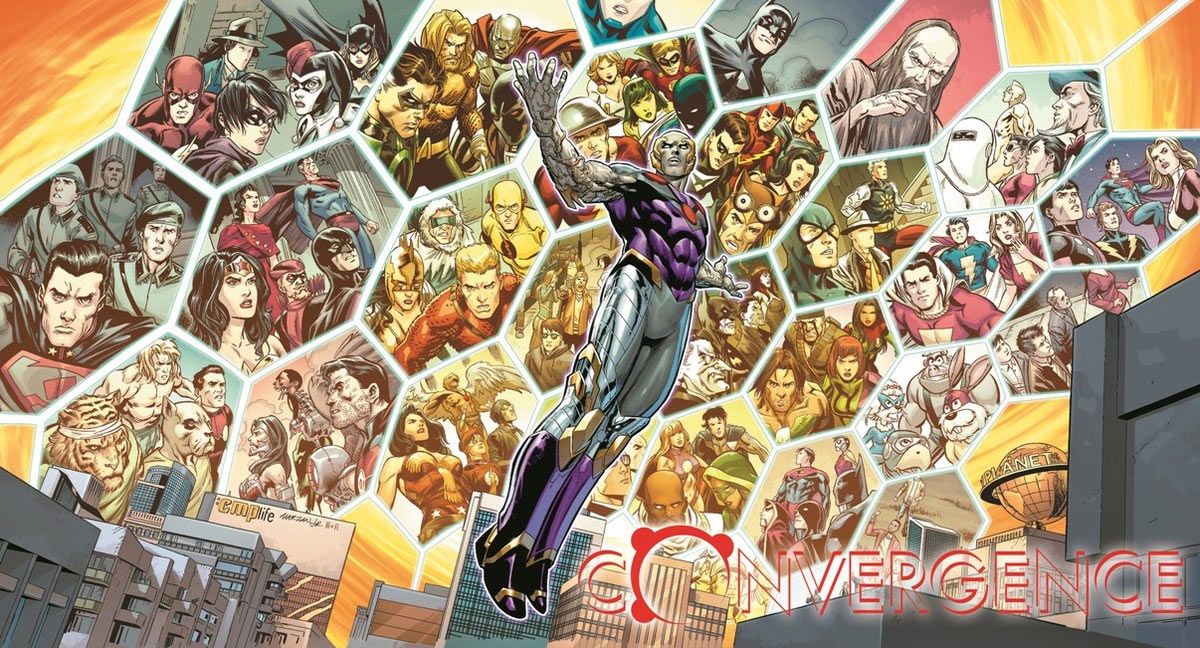Jeff King may be a new face to comics, but he's an old hand when it comes to dealing with alternate universes.
The television writer has contributed stories to such alternate reality-heavy series as "Stargate SG-1" and "Continuum," a resume which put him on DC Comics' radar for "Convergence" -- the upcoming event series that reopens the pandora's box of the publisher's multiple realities. Over the course of April and May, "Convergence" will take over the DC line. In addition to the King-led eight-part "Convergence" series that serves as the event's main storyline, 40 different 2-part series will revive lost characters from past major cross-universal events like "Crisis On Infinite Earths" and "Zero Hour," along with more recent ones, including the currently running "Multiversity."
Joined in the event-opening #0 issue by "Futures End" co-writer Dan Jurgens and on various chapters by comics veteran Scott Lobdell, King is charting the course of where the entire DC Universe will go and what it will become, alongside a wealth of artists including Ethan Van Sciver, Andy Kubert, Ed Benes and more. DC's Earth 2 heroes star in the event -- after their own planet was destroyed as part of the weekly "World's End" series -- along with a cosmically enhanced Brainiac. When Brainiac begets a new threat called Telos, every reality the Superman foe has collected samples from will crash into the lives of Alan Scott, Jay Garrick and the rest of the Earth 2 survivors.
DC Promises Big Changes as "Convergence" Winds Down in May
With so many stories and so much history flowing into this event, CBR News spoke with King to get a better sense of his master plan for the worlds of the DCU. In our talk, King describes his own history as a reader of DC Comics, how DC's legacy heroes present the perfect opportunity to craft a mega event that doubles as a relatable family tale, the way in which Telos twists the expectations for Brainiac stories to come, and what, exactly, will be left of the New 52 when all is said and done.
CBR News: What was it that served as the most compelling hook for you when you were offered the chance to essentially destroy and then rebuild the DCU. How did you approach the task of telling this story that's built on all the work done in "The New 52: Futures End" and "Earth 2: World's End"?
Jeff King: First off, I'm kind of standing on the shoulders of giants here because it's not just those books, it's the 75-year history. And specifically, it's everything since "Crisis" and how that's changed the landscape of the characters. For me, I've learned a lot from Dan Jurgens on #0 and Scott Lobdell, who's been helping me out on parts of #1 though 8, but it's also been talking to people like Brian Azzarello and Scott Snyder and Geoff Johns and Daniel Wilson coming out of the "Earth 2" books. We all get, give and share information. DC Editorial also plays a huge role in that -- especially in a huge event like this.
What I did was come to the project with a background in TV series with big, rich histories and world building, like "Stargate SG-1," or "Continuum," more recently. What I did was take a starting point of "Earth 2" heroes that are coming into my series. There's a gorgeous Ivan Reis/Joe Prado cover where you'll see some of the people who will be featured prominently in the series, including my villain, Telos. But everyone knows that Green Lantern will be involved in a big way. We're also picking up not only from "World's End" and "Futures End," but we're also picking up threads from "Doomed" and "Action Comics" and also from Grant Morrison's "Multiversity." It's really connected, in a meta way, to all of those things.
Readers of DC Comics can fall into any number of camps in terms of their familiarity with the deep details of DC's cosmology. From a passing familiarity with the Justice League all the way up to having a PhD in DC continuity, where would you place yourself on the spectrum coming into "Convergence"? And where did you end up as a result of writing it?
My background with DC was mostly the old Kirby books -- "New Gods" and "Forever People" -- and also things like "Metal Men." Obviously, I knew the Batman and Superman world too, but that stuff was really my introduction to DC. It's only been coming into "Convergence" that I've really been able to appreciate the 30 years of DC history since "Crisis." I don't think I appreciated how daunting this project was going to be when I agreed to do it. [Laughs] I think I probably should have run for my life.
Part of the appeal of the whole "Convergence" event is that anyone who's ever loved a weird part of the DC Universe has a chance of that character or idea appearing somewhere in this event. But as the person who's tasked with making this a coherent story that's more than odd worlds, who is the character that grounds you in what's going on and drives the story forward?
Well, I've got a great set of characters, again, that you see in that first cover. You'll see Superman Val Zon, Alan Scott as Green Lantern, Jay Garrick Flash, Thomas Wayne Batman -- you'll also see the Dick Grayson from Earth 2. All of those characters brings the history they've just experienced in "World's End" to this, but they also bring a new set of expectations because they've grown and changed in those books.
What really stoked me from the beginning is what I get to do with those characters. I really wanted to let Thomas Wayne and Bruce Wayne meet for the first time, and I wanted to have Dick Grayson be a part of that. You'll see various characters' connection with their analogues from other universes. Imagine Alan Scott meeting up with Hal Jordan and with Kyle Rayner and John Stewart. Imagine Jay Garrick meeting up Barry Allen and with Wally West and the kids. Fastbak [from the Zoo Crew] may even make an appearance! That's what was remarkable for me: to take the characters with a defined role in the story, put them up against a great villain like Telos and then have the rest of the DCU fold into it.
Brainiac has been stealing these cities and these various timelines all the way through the 75 years of the DC Universe, and particularly since the time of "Crisis," so we'll see all of those characters making appearances at some point. Some of the monthly solicitations give you snapshots into the characters that we'll feature.
One of the ideas that's frequently cited as a unique facet of the DC Universe is one of legacy. What does that idea offer you, thematically, as you crash these various analogues together?
One way or another, each of these characters has some kind of defining event that I looked at as being pieces of an evolution almost of a single person. In another way, it makes them all brothers and sisters in a family, and that's what I look for in a story. I look for a family relationship, whether it's a parent and a child, or a pair of siblings. Because from a commonality standpoint, we're all that on some level. We're all somebody's daughter or father, depending on where we are in our own timeline, just like the characters of the DCU.
As you spread out the tapestry of the DCU -- especially when people like you are such good curators of the history, and you bring new fans in to talk about them and get more educated -- it means people can understand, appreciate and have more access to this history. Even if your favorite character happens to be Hal Jordan, you have a feeling or an appreciation for where Kyle fits into that story. Or John, or however the larger life of the story extends. That makes a story like this that much richer for the fans.
On the opposite side of those heroes, I get the sense that there's a villainous aspect to the same idea here. We've known Brainiac as a collector of worlds, but Telos as a new force seems to be an offshoot of him that has his own ideas. Where does this new character diverge from his "Father" and how does that complicate the story?
You must be prescient! Have you ever been a mind reader? [Laughs] Without saying too much about it, I will say that Brainiac and Telos are intimately connected, and we're going to reveal something about the meta history of Brainiac's role in the DCU. That's connected to what Grant Morrison has been doing in "Multiversity," and it speaks to some ideas that came through in "Doomed" and in "Action Comics" #35. I can tell you that we're going to have a rich understanding of those characters, and you're going to see a very complicated relationship between Brainiac and Telos. Initially, the odds for our heroes are not going to be pretty because of that.
As all this is going on, there is this multitude of two-issue tie-in series which revisit past eras of the DC Multiverse. And we've noticed that those minis roll out week-by-week with each new wave addressing a different event in DC's past from "Flashpoint" to "Zero Hour" to "Crisis" and so on. Can we assume that the story of the main "Convergence" series will also kind of rotate through those past eras as each new weekly issue arrives?
That's a really good question -- and the answer is that, in the unfolding of the conflicts that have been set up by Brainiac's original plan, you'll see an intention to go back through that timeline -- that series of consecutive events. But other than that, everything is leading up to one final conflict, and you'll see that in our story.
As you're very new to writing comic books, how have you responded to playing in the DC Universe? Is there any one character or franchise that you've found yourself most drawn to as you go?
Oh jeez. [Laughs] I think the relationships in the Bat family and also all of the connections between the characters I didn't formerly understand or appreciate that I do now -- I couldn't even begin to start! Every event that's happened up to this point, whether it be "Flashpoint" or "Zero Hour" or "Kingdom Come," all inform and serve as background for what's to come in "Convergence," but with a twist.
One thing a lot of readers associate with these series is reboots, and DC has already announced a slew of new, diverse titles coming out after "Convergence" wraps. As all the stories you're referencing here reshape the DCU in their own way, can you say if, when your series is done whether the universe will be in exactly the same shape it is, slightly different than it is or completely different than it is now?
[Laughs] I feel like, as the new kid, it'd be presumptuous of me to go right in and destroy everything. I think the fans are going to love the story that we tell, but I do feel like, coming out of "Convergence," we're setting the table for a whole new generation of stories to be told with characters old and new that in the past, either by continuity or by canon, would be the thing where a naysayer might have said, "You can't do that." Now, the possibility is there that we can.
Looking forward for yourself, now that you've gotten into comics and the DCU, are you feeling like there are characters or concepts you want to continue to write moving forward?
I've been a lifelong fanboy and always wanted to have the opportunity to take the time to write a comic, so this is a bucket list item for me, for sure. And the answer is, "Absolutely." It's all a matter of whether my schedule works out to allow me the things I'd like to do, though we've been talking a bit. So if people like "Convergence," maybe I'll be lucky enough to get a chance to do this again.
And finally, for people stepping into "Convergence" cold without having read all the background issues when your #0 issue arrives on April 1, what is the element or scene early in the story that they should watch out for to carry them forward into the series?
You should look for Brainiac. You should look for the relationship between Brainiac and Telos, because that will tell you a lot about the story going forward.
"Convergence" kicks off April 1 with a #0 issue

